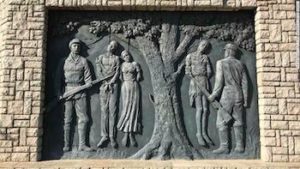
*On this date, in 1904, the Herero and Namaqua genocide began. This was a white atrocity against a Black community in Africa between 1904 and 1908.
The conflict was one of the first colonial rebellions after the Berlin Conference. This was the high point of white European competition for African territory, a process commonly known as the Scramble for Africa. The Herero and Nama genocide was the first genocide of the 20th century, waged by the German Empire against the Herero, the Nama, and the San in German southwest Africa (now Namibia). In January 1904, the Herero people, led by Samuel Maharero, and the Nama people, led by Captain Hendrik Witbooi, rebelled against German colonial rule. They killed more than 100 German men in Okahandja, though sparing women and children.
In August, white German General Lothar von Trotha defeated the Herero in the Battle of Waterberg and drove them into the desert of Omaheke, where most died of dehydration. In October, the Nama people rebelled against the Germans, only to suffer a similar fate. Between 24,000 and 100,000 Herero, 10,000 Nama people, and an unknown number of San died in the genocide. The first phase of the genocide was characterized by widespread death from starvation and dehydration due to the prevention of the Herero from leaving the Namib desert by German forces. Once defeated, thousands of Herero and Nama people were imprisoned in concentration camps, where the majority died of diseases, abuse, and exhaustion.

Memorial Stone
In 1985, the United Nations Whitaker Report classified the aftermath as an attempt to exterminate the Herero and Nama peoples of Southwest Africa and, therefore, one of the earliest attempts at genocide in the 20th century. In 2004, the German government recognized and apologized for the events but ruled out financial compensation for the victims' descendants. In July 2015, the German government and the speaker of the Bundestag officially called the events a "genocide." However, it has refused to consider reparations. Despite this, the last batch of skulls and other remains of slaughtered tribesmen taken to Germany to promote racial superiority were taken back to Namibia in 2018, with Petra Bosse-Huber, a German Protestant bishop, describing the event as "the first genocide of the 20th century".